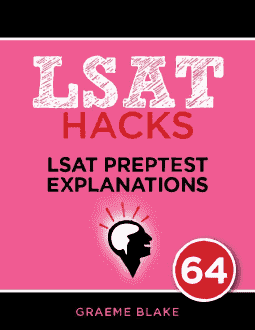QUESTION TEXT: The French novelist Colette (1873-1954) has been…
QUESTION TYPE: Necessary Assumption
CONCLUSION: Colette wasn't indifferent to moral questions.
REASONING: Colette's works must have raised moral questions.
ANALYSIS: I can raise a moral issue (“Is it right to rob this bank?”) while being indifferent to it (“I don't care about that, I like money”). This argument assumes that people who raise moral issues care about those issues.
___________
- Even if the critics didn't greatly underestimate Colette, they might still misunderstand Colette's use of emotional and moral issues.
- CORRECT. If a novelist who condenses emotional crises does have to be indifferent to moral issues, then Colette must have been indifferent to moral issues. This wrecks the argument.
- The negation is: a novel might be greatly praised even if it doesn't raise moral questions. That doesn't do anything. The author wasn't making a general claim about when a novel deserves praise. They only claimed that Colette did care about moral issues.
- Who cares why Colette's language was vivid? The only issue was: Did Colette care about moral issues? Her use of language has nothing to do with her beliefs about morality.
- This would support the author, but it's not necessary. Colette might have cared about moral issues, even if that wasn't why she condensed her characters' emotional lives. Also, you don't negate “all” to none. You negate it to 99.9% (“not all”).
Negation: “In 99.9% of the cases where she condensed moral emotional crises, it was to explore moral questions. In 0.01% of cases, however, she just did it for fun.”, OR
“Collete's novels were concerned with moral issues, even though that isn't why she condensed emotional crises.”
Tip: Negations are not some technical issue where you find the right word. You're just identifying the concept, and making it “not true”.

Free Logical Reasoning lesson
Get a free sample of the Logical Reasoning Mastery Seminar. Learn tips for solving LR questions


novel*
Yes, (B) does not provide a firm stance either way, but if a novel that poetically condenses a major emotional crisis HAS to be indifferent to the important moral questions raised by that crisis, then the argument in the stimulus falls apart.
Using the negation test (negate the answer choice in a necessary assumption question, plug it back into the argument, and if the argument falls apart, you’ve found the correct answer) can be extremely helpful when trying to decide between two answer choices of this question type.
I was torn between B and and E and ultimately settled on E because of the wording of B.
The author’s argument was that crtics’ charges – of Collette’s indifference to moral questions – were unfair. In support, the author cites collette’s poetic condensation of emotional crises (PCEC), which invariably raise moral questions.
The way B is worded, all it is saying is that PCEC may or may not be indifferent to moral questions. It takes virtually no stance on it (“does not have to be” = not necessarily true = could be false, etc).
I feel a better answer would have been “A noble that poetically condenses a major emotional crisis CANNOT BE (or can almost never be) indifferent to the important moral questions raised by that crises”
Can you explain the use of the “all” negation here? I do not see it in the Answer Choice E, and yet its a reason that answer is wrong. I am missing something
We’re told in the stimulus that each of her novels is a poetic condensation of a major emotional crisis in the life of an ordinary person at the time. So, the explanation for (E) negates the statement “Colette’s purpose in all her novels…was to explore some of the important moral questions of her time”. The negation is that in not all instances was that her purpose.
I thought of it this way:
Collete’s purpose is not relevant. What matters is whether the novels themselves are indifferent to moral questions (the subject of the argument’s thesis, and the one referred to in the correct response). The novels may raise moral questions or not, regardless of what she intended in writing them. So, we don’t have to worry about percentages. Negate this assumption so that her purpose was to consider moral questions 99.9 percent of the time, or to 0 or 100 percent, and it still has no bearing on the argument.